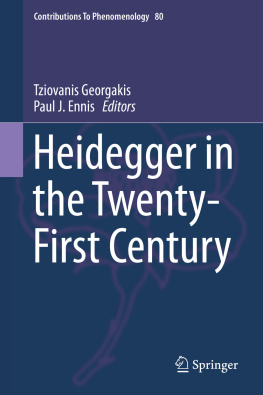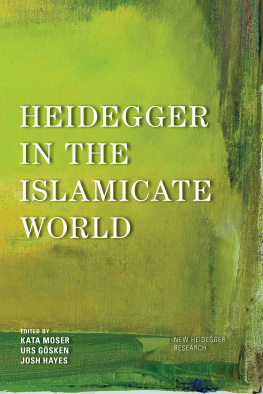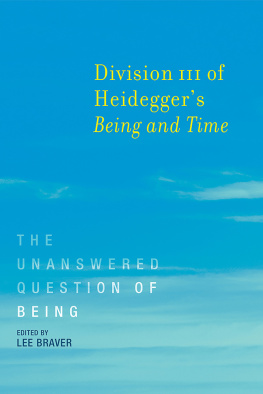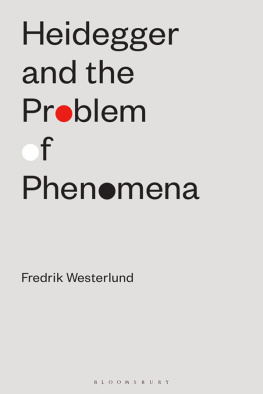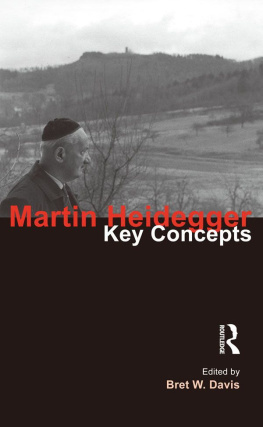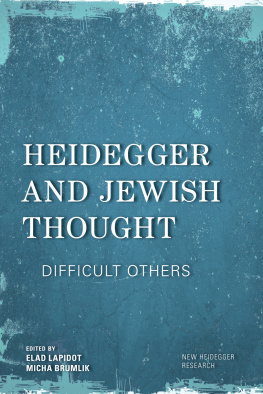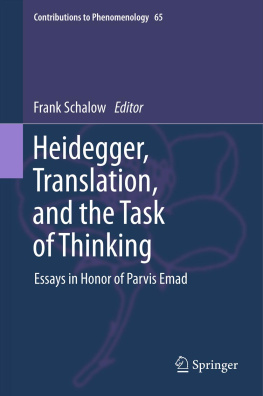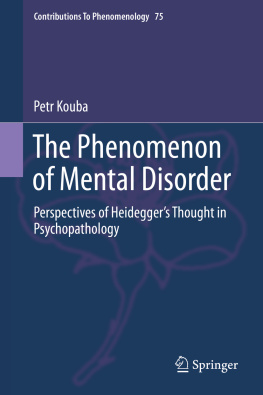1. Prolegomena to a Twenty-First Century Heidegger
In his last lecture course given at the University of Freiburg in 1944, right before he was drafted to the German army, Martin Heidegger introduces philosophy as a guide to authentic thinking through the works of Nietzsche and Hlderlin. Right at the very beginning of the lecture, in a paragraph entitled The Impossibility of an Intro-duction [Ein-leitung] to Philosophy, Heidegger bluntly states that strictly thought, there is no intro-duction to philosophy (GA 50, p. 90). For Heidegger, whoever plans an introduction to philosophy presupposes that one could possibly stand initially outside it. But such a task is impossible because a human being is a historical being who always already, and essentially, stands within philosophy. Historical humans are philosophical in their essence not because they make use of philosophical knowledge as it has been handed down to them from their intellectual tradition. Rather, as Heidegger notes, historical humans reflect [denkt an] the origin and future out of philosophy, and, from the horizon [Gesichtskreis] of such reflection, they think what has been, what comes, and what is present (GA 50, p. 90). Human beings are philosophical because they have been thinking in accordance to the ways of being which are strictly reflective: poetic and philosophical. Necessarily then, as reflective historical beings, humans always and already philosophize and no longer have the need to be introduced to philosophy.
Nonetheless, the reassurance that humans have always been philosophizing is in no way comforting for us specific humans who have been dealing with philosophical issues for many years. For anyone who wishes to philosophize, the nature, history and practice of philosophy are accompanied with a certain level of anxiety. If anything else, the act of philosophizing arouses uneasiness and apprehension resulting from an uncertain anticipation that philosophy as a proper subject matter with certain attributes can be understood and discerned clearly in a pronounced manner. In fact, Heidegger is ready to admit that philosophy is not, however, what it widely and continually appears to be: the remote or the beyond of genuine life (GA 50, p. 92). In philosophy, anticipation and apprehension arrive together and consummate an open field of ambiguity and uncertainty, a difficult discourse that is impossible to be condensed and mastered. Heidegger concludes:
Rather, philosophy as genuine thinking is the continually unknown region in which habitual thinking constantly sojourns without becoming versed or at home in it as the property [Eigentum] that has been allocated to the essence of humans insofar as they are the thinking ones. (GA 50, p. 92)
In any case, thinking in the direction of the question of the meaning of being is that which solely constitutes thinking for Heidegger, and the current volume wishes to provide a rather difficult reflection on what thinking might become after Heideggers philosophy. The chief significance of this volume for contemporary Heideggerian research is that it navigates its tangled paths and maps out new routes that remain susceptible to hidden bends and twists. At the same time, this volume plays out the diverse and often unpredictable expressions that the question of being can obtain after Heideggers advent. In a way, then, the presented volume stands in a crucial juncture where Heideggers perplexing thinking is summoned from many different locations but is also splintered to many other surprising directions.
Hence, the aim of the current volume is to critically expand the current field of research by presenting unfamiliar and unchartered avenues that will guide and carry the Heidegger scholarship into the twenty-first century. Some of the essayssuch as the ones by Glazebrook and Story, Tonner and Babichare intended for a broader audience that might not be well-versed in Heideggers philosophy. Some other essayssuch as those by Haas, Keane and Haase and Sinclairare more suitable for specialists in Heideggers thinking. Finally, some essaysincluding those of Moran, Raffoul and Hoganare of keen interest to those who are concerned with the intricate relationship between Heidegger and other thinkers such as Husserl and Derrida.
Section I, On Methodology: Ambiguity, Transcendence, and Ground, sets the stage for the volume with three articles emphasizing the importance of methodology for the future of Heidegger studies. In The Ambiguity of Being, Andrew Haas sketches Heideggers reading of the concept of being in Parmenides and insists on staying true to the question of the meaning of being regardless of its ambiguous nature. In Haas impassioned plea for faithfulness to Heideggers original project, we are tasked with learning to think aporetically: to think being by not thinking it. Haas here suggests that readers of Heidegger should adopt a Socratic approach and accept in an ironic way that the act of thinking presupposes that one does not yet think. This ambiguous withdrawal towards the unthinkable that precedes the thinkable remains for Haas the departure for Heideggerian scholarship in the twenty-first century.
Dermot Morans Dasein as Transcendence in Heidegger and the Critique of Husserl investigates Heideggers development of the concept of transcendence from the late 1920s to the eventual abandonment of the term in the early 1930s. Moran firstly examines Heideggers articulation of finite transcendence in terms of his critique of Husserls notion of the transcendence of the Ego, and he secondly points out the way in which Heidegger offers a re-thinking of the nature of intentionality in terms of the transcendence of Dasein. Moran argues that Heidegger does not offer a radical alternative to Husserls notion of transcendence and concludes that the difference in their conceptions of the notion of worldhood remains to be explored as an important project for the twenty-first century Heidegger studies. He also insists that phenomenology as transcendental philosophy remains in the sphere of correlationism, so recent speculative realist readings of Heidegger could only be viewed with suspicion in the future.
In his The Self that Belongs to an Abyssal Ground: Reading Heideggers Beitrge zur Philosophie , Niall Keane explores the complicated relation between self and ground as it is unfolded in Heideggers work of the late 1920s and 1930s. He argues that Heideggers philosophical thinking eventually turns to an abysmal ground as the hidden foundation [ fundamentum ab-sconditus ] which claims and responds to the question of the meaning of being and provides an understanding of what it means to be a self. For Keane, the future of Heidegger studies involves the recognition of an essential need for questioning which suspends all seductions of philosophy without necessarily leaving them behind. The real significance of Heideggers analysis of ground and selfhood is its appeal for a groundless terrain of philosophical deliberation which extends itself in the unknown future.
Section II is entitled History, Responsibility and Voice. It examines the historical, ethical and vocal-poetical in Heideggers thought and draws conclusions and lessons relevant to the Heidegger scholar of today. In History and the Meaning of Life: On Heideggers Interpretations of Nietzsches 2nd Untimely Meditation , Ullrich Haase and Mark Sinclair investigate Heideggers recently published seminars on Nietzsches 2nd Untimely Mediation , given in 1938 and entitled On the Advantages and Disadvantages of History for Life (1874). According to the two authors, the Heidegger of the late 1930s returns to Nietzsche, whom he had earlier appropriated in terms of Being and Time , and reworks a different notion of the concept of life that has remained unexplored within his earlier Nietzsches texts. A careful re-examination of Heideggers intricate relationship with Nietzsche, according to Haase and Sinclair, has a double significance for anyone who wishes to foresee the advent of Heideggerian scholarship in the twenty-first century. On the one hand, it is still necessary to go through Nietzsche in order to understand Heideggers transition towards another thinking, which still remains unthought today, since Heideggers confrontation with philosophy involves Heideggers confrontation with Nietzsche. On the other hand, Heideggers confrontation with Nietzsche involves Nietzsches confrontation with philosophy that goes beyond the philosophy of life as it emerges in his 2nd Untimely Mediation . In effect, as one could infer from this chapter, Heideggers confrontation with Nietzsche leaves the philosophical concept of confrontation as such, the confrontation of philosophy with philosophy, open to a transition towards another thinking that is historical and, thus, futural.

